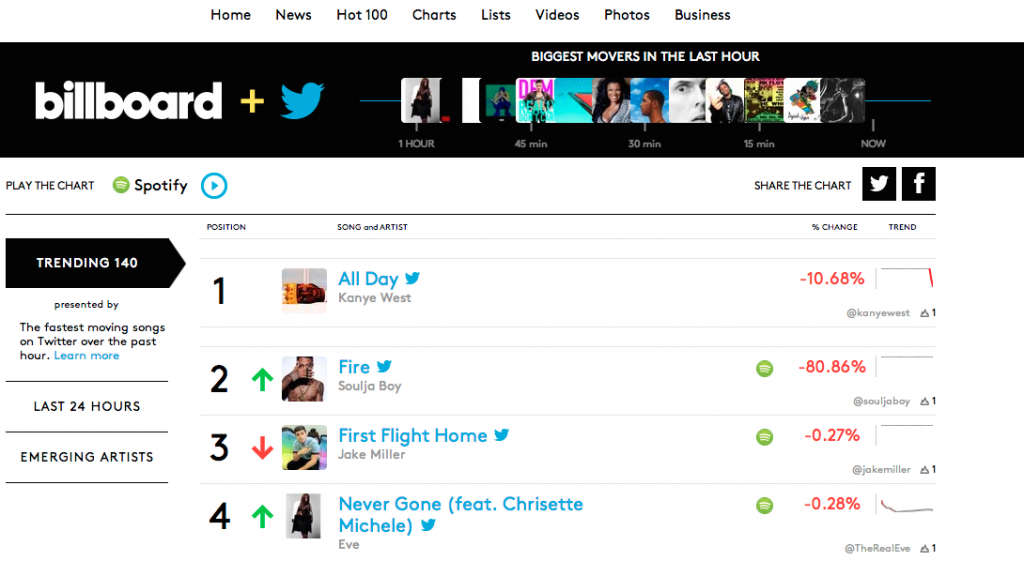In the information age, a problem has arisen. Your favorite artist’s new song leaks. It’s only a few seconds, was likely recorded by a phone in somebody’s pocket, and is barely audible. You don’t have much of a choice. You find a way to put it on your phone and listen to it on repeat.
This is exactly what happened last week. A grainy, distilled version of Kanye West’s new single “All Day” leaked, sending Kanye stans like myself into a frenzy. As a result, the poor-quality version made it to the top of Billboard Trending 140 for five consecutive hours, a testament to the rapper’s true influence. Kanye’s hype-train went so strong that it rivaled and surpassed all the pre-planned marketing for all other songs and artists of that day. This brings me to my point, THAT RECORDING WAS HORRIBLE AND YET PEOPLE LOVED IT. Collectively, the internet wasn’t going to let some static and reverb overshadow the fact that Yeezy season is approaching once again.
Kanye loves comparing himself to Apple and Steve Jobs. And like the tech giant whose new products are oft to leak early, so too have Kanye’s most anticipated songs. I listened to a ripped version of Mercy on repeat during a three-hour road trip in 2011, and I’m still waiting for this J. Cole and Kendrick Lamar song to finally drop. In a world where instant gratification isn’t a privilege but an expectation, music fans will do anything to make sure they can listen to a song whenever they want to, whether or not it’s finished.
Before “All Day” my most recent struggle was with Chance the Rapper’s live performance of “Wonderful Everyday” (his rendition of the Arthur theme song) from Sasquatch. It’s a perfect sunny day driving song, complete with inspiration from Chance and an 8-year-old anthropomorphic aardvark. By the time the studio-mastered version arrived, I had become so used to the poor-quality concert feed with its quirks and crowd-noises that the final cut was the version that felt off.
In that same vein, the flaws of the recording often become a part of what makes it so great. Sometimes this added treasure comes as a “tag” (really a phrase) a DJ will put into a song when he gets the leak or early release and plays it on his radio show. The tag allows the listener to associate the song with him and gets the tag stuck in their head with the song. This is so important to the DJ because music’s value has a very strange property depending on who releases it. Exposure and attention are quick and fleeting, so whoever releases the song first gets it.
Artists have come to understand that they will probably make more money from touring than record sales, and you can see why. If an artist releases a song on time and through a pay-outlet the attention is on their craft, the money (at least most of it) goes to them. Conversely, if someone leaks a song, the value of the attention and exposure goes to them. If a blogger gets his hands on a demo and posts it to his site, then other sites will have to link to that site for it. That site owner now has the momentum of the song, not the artist. Then, potentially months later when the song comes out, people may even be tired of hearing it.
It’s hard not to feel like artists are indebted to us and should give up everything they record as soon as they can. That’s just how our on-demand culture has bred us. What do you mean we can’t listen to it right now? Ultimately, you have to wonder whether obsessive fanhood and need for content is helping or hurting artists. In Kanye’s case, it likely helps him. It builds hype until the single is released properly. In 2006, Lupe Fiasco’s debut album leaked almost five months early, causing him to scrap and rearrange certain parts of an album. As an up-and-coming rapper awaiting his first major album release, this probably ended up hurting Lupe’s record sales. It will be very hard for me to not listen (and listen and listen) to an anticipated song when it leaks, but after careful consideration, I will make a conscious effort to purchase the music if I do end up enjoying it.
